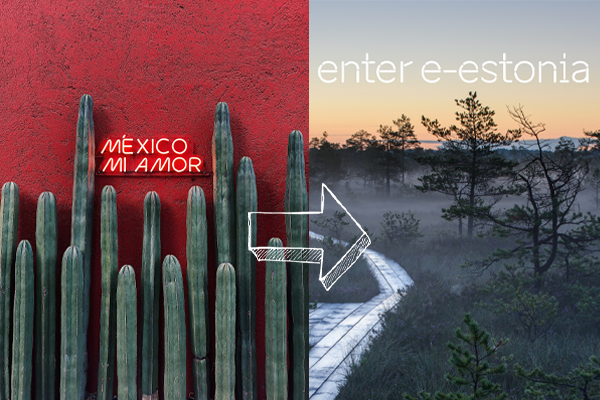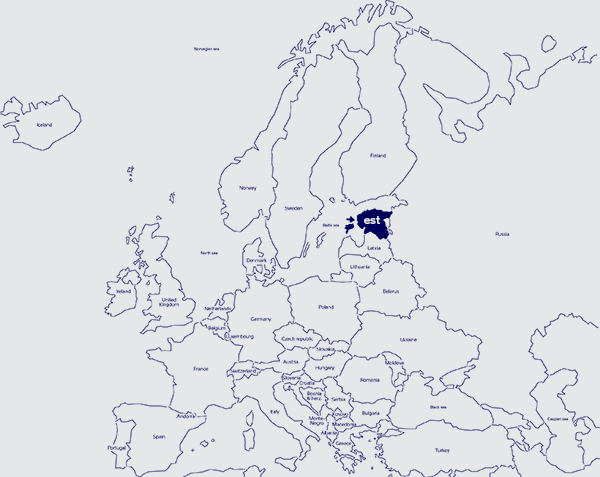
"Hi, my name is Omar and I am from Mexico. Last year, I started PhD studies for Building and Civil Engineering and Architecture at Tallinn University of Technology and that is when I also joined the Study in Estonia Student Ambassadors Team. I have lived in several other countries like Canada, Spain, and England, so I am used to experiencing different cultures and adapting to them. I am grateful for being here, and I am sure there are people out there who would like to have a similar experience. In that way, I am very excited to share my experience and hopefully encourage others to take the opportunity to come and study in Estonia." - Omar

From Mexico to Estonia. Photos: Unsplash & Brand Estonia
"Why Estonia?" is the main question I have been asked when I say I am from Mexico, and I am doing a PhD at TalTech. I like to reply very enthusiastically: "Why not!?" In this post I would like to share with you (with the same enthusiasm) 4 facts about Estonia that motivated me to pursue my PhD here over other countries.
First, let me tell you a little bit about my own experience in my journey of coming to Estonia. The first half of 2020 I applied for several PhD programmes mainly in Central Europe, until last summer, when I got 4 funded PhD offers from 4 different countries (including Estonia). Although I had a strong interest in the 4 PhD programs, the following facts were my main motivation: Estonia is a small country, living costs are low, there are funding opportunities open to foreign students and it is a digital society. Moreover, I was attracted by the education system and facilities, but for this time I will just talk about general country facts described below.

Estonia on European map. Illustration: Brand Estonia
1. Small country
It is just probability - most of the time students look up popular countries, e.g. Central Europe countries, and the higher the number of applications the more difficult it gets to get enrolled in a program. On the other hand, with less number of applications the easier it is to get enrolled in a program! As I mentioned before, I applied for several PhD programmes in Central Europe countries and very often the replying time was quite long (about three months) due to the high number of applications. So, I just extended my research field of PhD programmes to Estonia, and the same month I submitted my application, I got an offer letter!

Walking in Tallinn Old Town. Photo: Rasmus Jurkatam
2. Living costs
Living abroad very often will be quite pricey due to currency exchange (e.g. if you live outside the EU), differences in the gross domestic product (GDM), international taxes, insurance, etc. Compared to Central Europe and North America, Estonia is an affordable country regarding living costs and taxes for foreigners. To give you an example: when I was doing my masters in the Northeast of England (in a small town), my living costs in a shared house (with 3 people) were almost the same as living in Tallinn (a capital city) in a single flat! Also, in the case of potential taxes, as an international student from outside the EU, you will only be required to apply for a visa, residence permit and medical insurance (although for PhD students you might be eligible to get medical insurance depending on the programme).

TalTech library. Photo: Jevgeni Salikhov
3. Funding opportunities
Although it is very common to find funding opportunities for Master's and PhD programmes (especially in the science field), most of the time they demand you to be a resident of the funding country. But this is not the case in Estonia! In my own experience, funding opportunities are not limited to Estonian residents. On the contrary, academics appreciate student’s talent no matter the nationality!
4. Digital society
Imagine you just move to a new country and you need to open a bank account to get your student allowance, but unfortunately there is a pandemic out there, so moving in a city you don’t know can be inconvenient. This is not an issue in Estonia! Plenty of services can be done online with your ID-card or residence permit card (for foreigners). For example: open a bank account, sign documents digitally, buy a pre-paid public transport ticket, borrow books in the library, gain access to your medical data, and much more!
At this point you might be thinking “Estonia sounds like a good place to study, but I am afraid I don’t speak Estonian”. However, there are more than 250 degree programmes offered in Estonia which are fully taught in English! If you are looking to study abroad at any level, I am asking you now! Why not start looking up study programmes in Estonia?
Written by Study in Estonia Student Ambassador Omar.
Acknowledge of funding entinty: Omar’s PhD is founded by the European Project Guided Waves for Structural Health Monitoring (GW4SHM) (H2020-MSCA-ITN-2019-860104).
